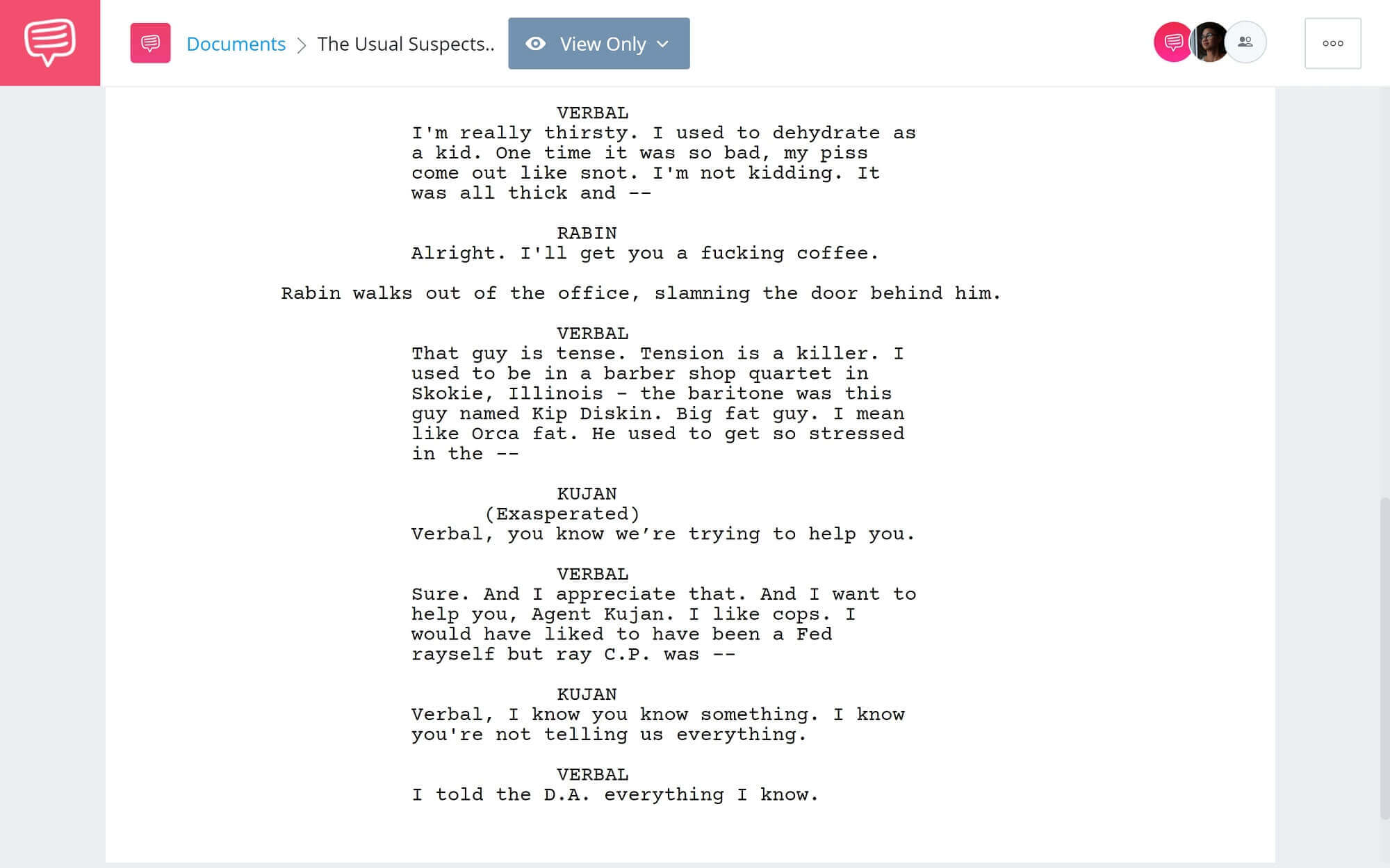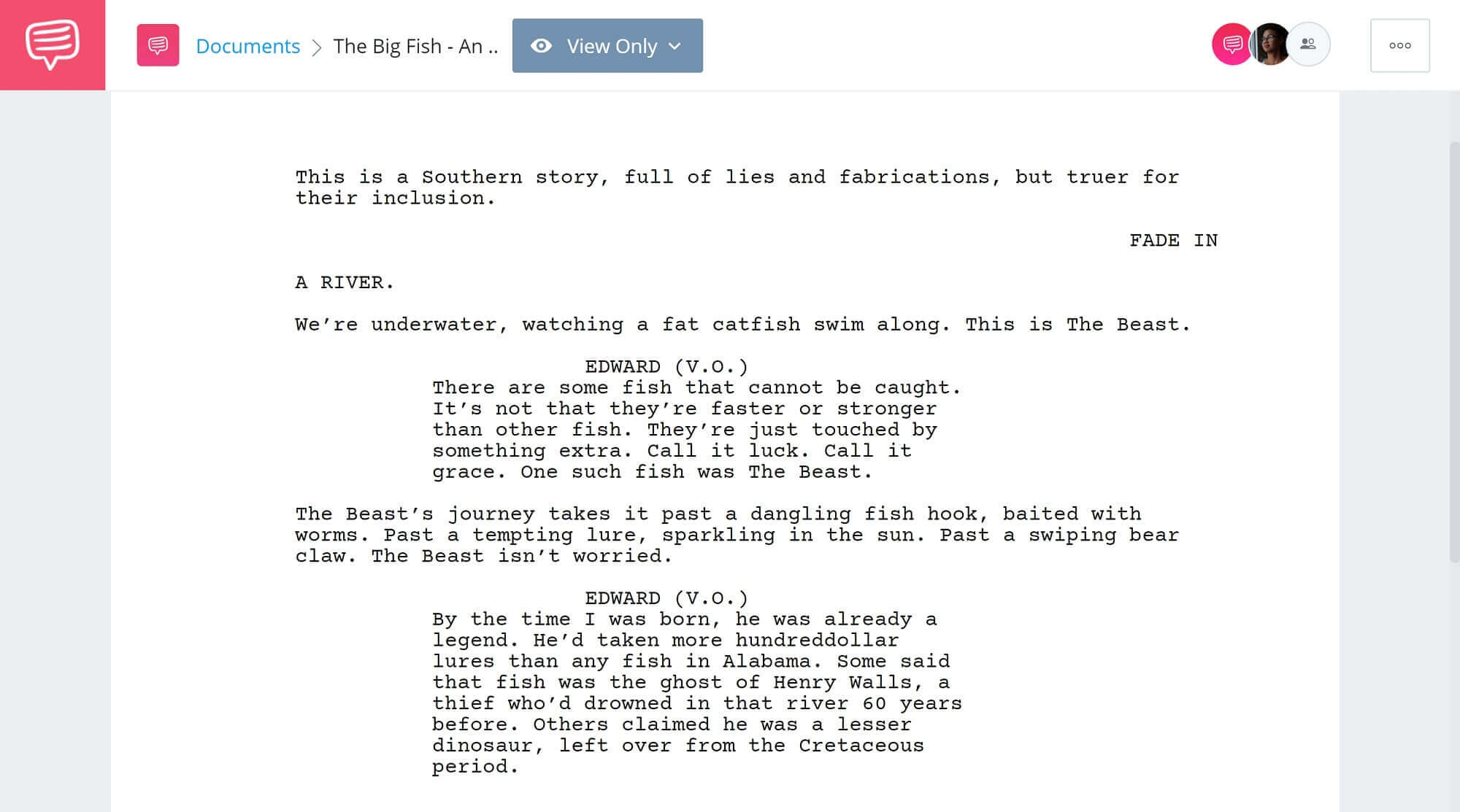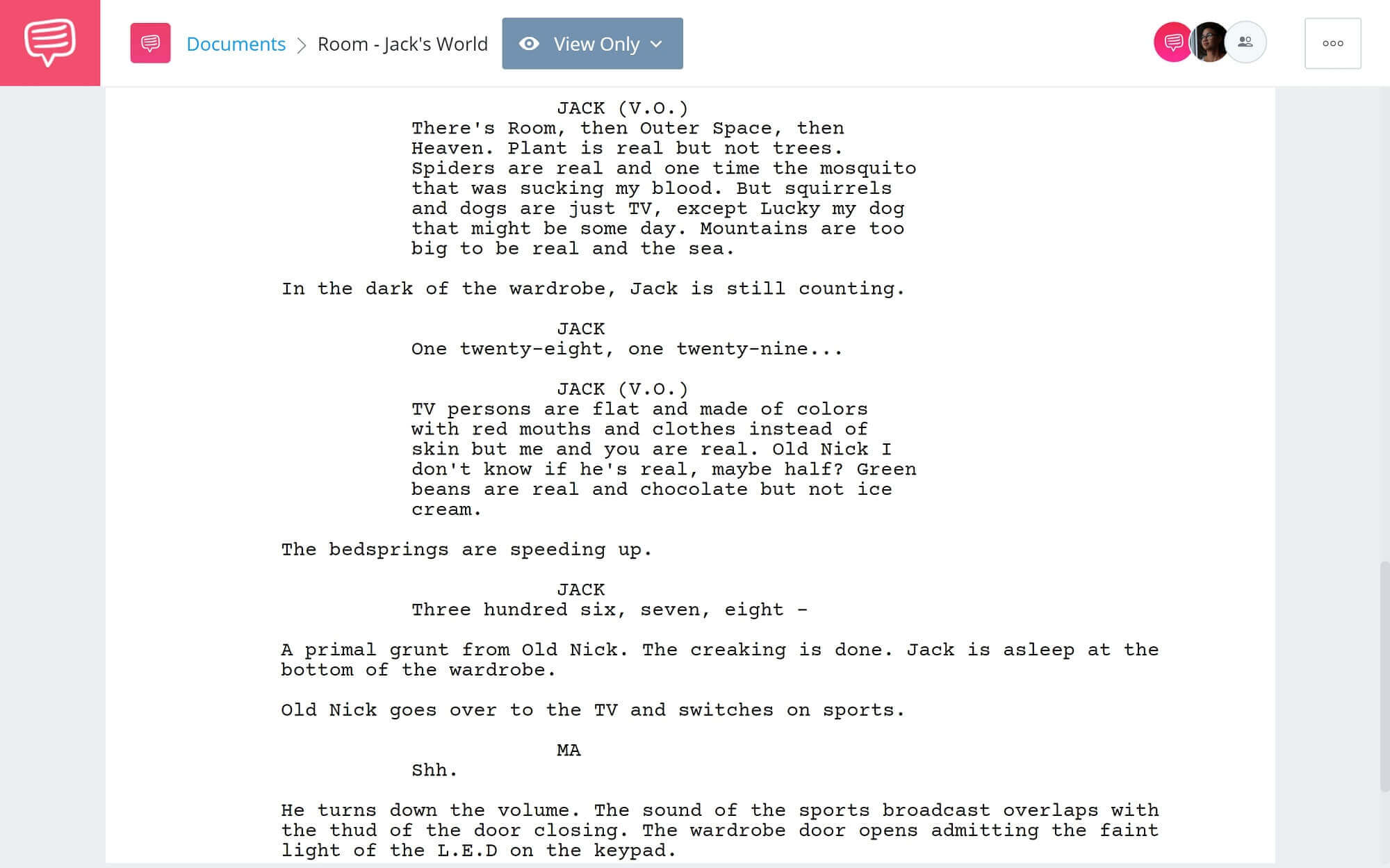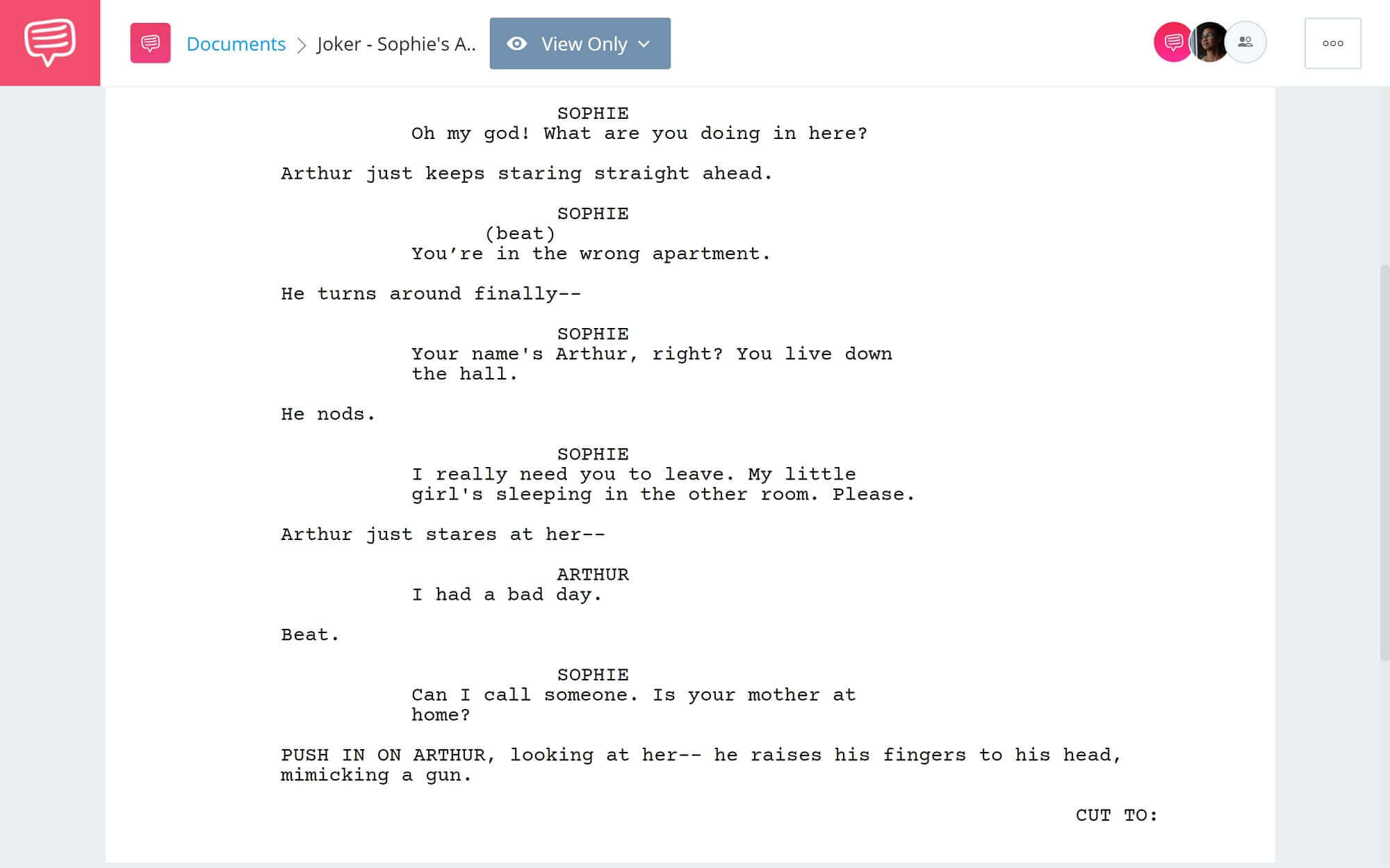What is an unreliable narrator? We expect the narrator of a film to guide us through the journey and tell us the truth. But what happens when the narrator’s credibility is thrown into question? When we can’t even trust the narrator, it changes our perception of the film.
When done well, an untrustworthy narrator can create more complex characters, flesh out pertinent themes, and develop plot twists people talk about for years to come. We’ll provide you with the unreliable narrator definition as well as the different types of unreliable narrators in case you’re thinking of including one in your next script. Who knows? You may end up creating the next great plot twist in cinema.
DEFINE UNRELIABLE NARRATOR
Understanding a flawed narrator
Some narrators make their unreliability known from the beginning. For others, it’s only revealed at the very end, changing the viewer’s perspective of the entire film. But there are similarities across these different types of narrators.
By the way, we are going to spoil the following films:
- The Usual Suspects
- Life of Pi
- Atonement
- Big Fish
- Room
- Joker
- The Sixth Sense
UNRELIABLE NARRATOR DEFINITION
What is an unreliable narrator?
An unreliable narrator is a character whose perspective we follow in the story but lacks a certain degree of credibility. These narrators may simply lack all the information necessary to adequately translate the story to the audience, or they have a clear bias. While in literature, a narrator generally has to be first-person, in film, we can have a second- or third-person unreliable narrator as long as we see most of the story from his or her perspective.
What are some unreliable narrator examples?
- Tyler Durden/The Narrator in Fight Club
- Patrick Bateman in American Psycho
- Amy and Nick in Gone Girl
- Leonard Shelby in Memento
- Alex from A Clockwork Orange
Critic Wayne C. Booth was the first to coin the term “unreliable narrator” in 1961. However, the concept has been around for centuries. You can find this concept in Greek playwright Aristophanes’ comedy The Frogs all the way back in 405 B.C.
One of the earliest uses of an unreliable narrator in film is in the 1920 German expressionist film The Cabinet of Dr. Caligari. The film ends with an epilogue stating that Francis is actually a patient in an insane asylum and much of the film is simply a delusion.
Numerous films have gone on to make the technique entirely their own as this video essay from Fandor shows.
I’ll Believe It When I See It • Fandor
So how can you make a fallible narrator that doesn’t feel too gimmicky? After all, you want to showcase the characteristics of an unreliable narrator without giving too much away at the very beginning. To see how you can incorporate one into your narrative, you first need to consider the different types of unreliable narrators out there.
WHAT IS AN UNRELIABLE NARRATOR?
Type 1: The Self-Preservationist
The first type of narrator we’ll look at is someone who lies for obvious reasons: the Self-Preservationist. This is a narrator who deceives the audience and/or other characters to save his or her own skin.
You may see it in films like Gone Girl or Wonderland where a character has committed a crime and needs to avoid authorities. The reason for the deception is clear, and perhaps the best example of it is The Usual Suspects. You can read the full screenplay to see how this flawed narrator reads on the page.
The film utilizes a simple framing device — Verbal Kint confessing everything he knows about his crew and the crimes they’ve committed. Even when reading the screenplay, there’s no hint Verbal is lying because such details are so minuscule.
Barber Shop Quartet • The Usual Suspects • Read Full Scene
But as we later learn, he fabricated most of his testimony to the cops. This calls into question everything the police, and the audience, know about this story, and it all leads to a massive cinematic reveal.
The Reveal • The Usual Suspects
If you look closely at the screenplay, you’ll find that the reveal of “Skokie, Illinois” is given its own action line to further indicate its importance.
It’s also worth noting that in both The Usual Suspects and Gone Girl, both Verbal and Amy present themselves as victims. Their lies are designed to earn sympathy from the audience and from other characters.
So if you’re thinking of including The Self-Preservationist in your next script, make sure you present the character as weak or innocent so that their turn as the ultimate villain has the maximum impact.
UNRELIABLE NARRATOR EXAMPLES
Type 2: The Embellisher
The next type of untrustworthy narrator is The Embellisher as seen in Big Fish, Life of Pi, and Atonement. Similar to The Self-Preservationist, The Embellisher lies on purpose but for much less nefarious reasons.
I Felt It • Life of Pi
The Embellisher has mastered the art of the "little white lie." And they often mischaracterize the truth for emotional reasons. They often want to protect themselves from painful memories with a desire attain some kind of catharsis.
In Life of Pi, the fantastical story appears to be one man’s way of dealing with the trauma of losing his family. In Atonement, Briony fabricates the entire narrative to give her sister and her lover the story they deserved but never got because of her lies.
This Isn’t Weakness • Atonement
For a more in-depth example, let’s look at Edward Bloom in Big Fish. The screenplay begins with the following excerpt: “This is a Southern story, full of lies and fabrications, but truer for their inclusion.” Right from the bat, we know we’re getting false information.
An Introduction • Big Fish • Read Full Scene
This is made more evident when Edward Bloom tells a tall tale of how we caught The Beast, but his son isn’t having any of it. As we later see, Big Fish actually reverses our expectations of an unreliable narrator.
Because in the end, we learn that many of Edward’s stories were true. His son comes to appreciate his father and continues carrying on his stories. Although some parts of the story may not be true, they can still reveal a hidden ultimate truth.
At the end of Big Fish, Will Bloom tells his father an imaginary story of them escaping from the hospital before he passes away.
The Story of My Life • Big Fish
The embellishment here is to give Edward Bloom a final sense of catharsis before passing away.
When writing an Embellisher, it’s helpful to keep in mind how someone may want to invent a fiction to deal with a harsh, unforgiving reality. We still connect with this narrator, even if some of the details happened to be imaginary.
As you can see, there are many answers to, “What is an unreliable narrator?” And sometimes, the deception isn’t always intentional.
DIFFERENT TYPES OF NARRATORS
Type 3: The Naif
The Naif presents a different kind of narrator reliability. This is a narrator who is ultimately innocent, and while it can lead to embellishments, there is no ulterior motives behind the mistruths.
You can see The Naif in films like Room, Forrest Gump, and The Adventures of Huck Finn.
Right off the bat, the naïveté endears us to the narrator. We see their innocence, and we automatically root for them. You can see this childlike innocence at play in Room.
5-year old Jack is our narrator, and his narration in the screenplay paints a more fanciful world than the reality actually is. It functions as dramatic irony because we, as the audience, can comprehend the sinister reality while Jack is thankfully ignorant.
Jack’s World • Room • Read Full Scene
The interesting thing about The Naif is that we typically aren't set up for a twist ending. In the case of Room, we know trees and squirrels are real, but it functions to show how deprived the boy is and the dangerous environment he lives in.
While this form of narrator reliability doesn’t set up a twist, it does do something else very interesting. We know Jack and Ma will eventually escape the room, and you’re left to wonder how Jack will adapt when he realizes the world is bigger than he could have ever imagined.
Jack adapts well enough to the outside world, but we learn of his mother’s suicide attempt through his eyes. Like most things in this film, he doesn’t quite understand what happened, which makes you feel for the young boy even more.
Naifs typically don’t set up any grand final twist. They lay the groundwork for a more subtle dramatic irony.
Jack doesn’t understand his mother’s suicide attempt. Forrest Gump can’t comprehend why people would see him as an inspiration running across the country. And Huck Finn is unaware of the racial prejudices so prevalent of his time.
We, as the audience, are forced to look more closely at the story and ascertain the truth. Perhaps what’s being told to you isn’t exactly true, but it forces you to see the world through a different lens.
Related Posts
RELIABLE VS. UNRELIABLE NARRATOR
Type 4: The Madman
This leads us to our final type of untrustworthy narrator: The Madman.
This narrator has some form of psychological flaw that prevents them from understanding some key piece of information as seen in films like Joker, American Psycho, and Fight Club.
One of the most famous characters who falls under this definition is the Joker, particularly in the 2019 film of the same name. Arthur Fleck doesn’t necessarily narrate the story, but we can still consider him an unreliable narrator since he’s in practically every scene in the film and we witness things through his point of view.
The Joker has famously never been tied down to a single origin story. Consider this "version" from The Killing Joke.
Multiple Choice • The Killing Joke
Even when Joker is front and center, it’s hard to know when we can take him at his word. Throughout Joker, we see Arthur Fleck develop a relationship with Sophie. The relationship seems to be doing him some good until we get the big reveal.
Sophie’s Apartment • Joker • Read Full Scene
The screenplay doesn’t draw attention to the big reveal like in The Usual Suspects script. As a result, we’re as taken aback by the reveal as Arthur is. The relationship was all in Arthur’s head.
The Reveal • Joker
The last connection he had to happiness and reality is shredded. Combined with an earlier scene of Arthur envisioning himself on The Murray Franklin Show, one thing becomes clear:
Arthur’s delusions are related to his relationships.
We learn he craves affection. He craves a genuine family who cares about him. And the tragedy is that feeling loved will always be just out of reach for him.
That lack of empathy is the reason why The Madman narrator works best in this instance.
When writing a Madman, consider the themes or societal ills you want to discuss, and how your protagonist encapsulates those subjects.
Related Posts
CHARACTERISTICS OF AN UNRELIABLE NARRATOR
How to write an unreliable narrator
As you can see, there’s no clear cut answer to, “What is an unreliable narrator?” They can be criminals or children. They can have various motivations for wanting to lie. Your job as a screenwriter is to determine what motivations would cause a character to misrepresent the truth.
One tip to bear in mind when writing these different types of narrators is to set up the deception early on. You need to plant the seeds to where the audience could pick up on the deception in repeat viewings.
Take best Shyamalan movie The Sixth Sense as an example. By now, you should know how the movie ends. It turns out Malcolm Crowe was dead the entire time. We view the movie through his perspective, so for all this time, we assumed he was alive. But the twist doesn’t come out of nowhere.
I See Dead People • The Sixth Sense
We learn that in this film’s universe, ghosts exist, and they walk among us. The seed has been planted.
Failing to set up an unreliable narrator can make the audience feel cheated. You want the deception to come about organically and not simply be there to have a twist where a twist isn’t necessary.
So consider what type of unreliable narrator you’re dealing with and watch movies showcasing those narrators. You’ll quickly learn how to lie with the best of them.
Related Posts
UP NEXT
Is The Irishman Based on a True Story?
What is an unreliable narrator, and how do you set up deception with a true story? Those are the kinds of questions Martin Scorsese had to contend with when making The Irishman, where not everything we’re told actually happened. Learn more in our blog about how this murky truth was adapted into one of Scorsese's best movies.




